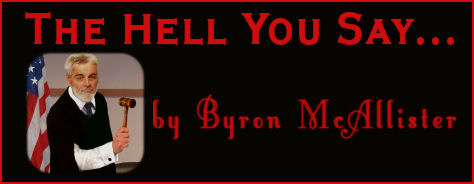 |
A Rose, Like a Character, by Any “Outré” Name Would Smell . . . (well, you know)
Suppose a detective novel begins like this: "The client's name was Aloysius Archibald Wilberforce Smith, and my job was to shadow his ex-wife, Mehitabel Arabella Jones, hoping to determine whether Aloysius could justify writing her back into his will. Mehitabel was a dashing young woman, and, even though she had abandoned Aloysius for reasons he still didn't understand, he still loved her." At one time such names as Mehitabel, Arabella, Aloysius, Archibald, and Wiberforce were in common use. They have all become rare, for whatever reason. Our hypothetical novelist—let's call him Mike, because what the hell, it's currently a popular name—can call his detective's quarry Mehitabel Arabella Jones if he wants to. Shucks, he can call her Scknnxi Shtoorf if he wants to. But when he sends the book to an agent or an editor, the laughter provoked by the grossly out-of-fashion name—or the silly one—will be an impediment to acceptance. The only possible defense (unlikely to work) is to launch immediately into some sort of discussion of how the characters came by the appellations. I have an investment to defend in the use out-of-fashion names, because one name I go by is Byron. It's still in use, but is much less common than it used to be. That's probably why it's often misinterpreted as some variant of Bryan, which, we all know, comes in the form of Brian, Brien, Bryon and so on. When people get my name wrong it could be because they didn't listen closely, don't look at individual letters when they read, suspect I mispronounced it, imagine I misprinted it, suspect me of not knowing how to say my name, or simply had it happen that their fingers or tongue didn't do things in the order they told them to. The fact that Byron is the name of a famous poet should help, but doesn't seem to, possibly because the person in question is a dead white male, and we all know how (shudder!) unfashionable they are. (Or have fashions changed again? That'd be nice.) My own investment, however, doesn't interfere with the fact that the name in the story has to fit the situation in the story. In a mystery, Byron might work, since many readers will fail to notice the difference between Byron and Bryon, reading it either way without stumbling. Mehitabel Arabella, on the other hand, could not be glossed over, and hence would cry out for explanation—and immediate explanation at that. You can easily find books that suggest ways to go about naming fictional characters. I only have one of those, Writer's Digest's “Character Naming Sourcebook.” It's by Sherrilyn Kenyon, who has a sufficiently out-of-the-ordinary first name that it might need explanation in a mystery. Despite some inadequacies, the book has helped me at times. For example, when I needed a Magyar surname, I found enough of a hint to come up with one that has worked okay in three novels and a few short stories. If you write science fiction, the problem is easier: make sure you use r's, k's x's and th's and consonant clusters of various sorts that suggest (and preferably possess) unpronounceability. But we're chiefly talking mystery and detection, here, and for mysteries it's better to avoid distractions of that sort. However, what if you don't write mysteries—just read 'em? Well, if you, like me, were raised on phonics, you will be able to go from what you see on the page to some not entirely unreasonable pronunciation, possibly even that which the writer intended. But if the name is too far out-of-line, you're going to find a messy name as distracting as an obsolete one. If your reading teachers were devoted to "look-and-say," then you read a lot faster than I do, and you won't be vocalizing as you go. (I don't mean I actually move my lips, but I do mentally hear the sounds.) But you're still going to be slowed down by Mehitabel , or Arabella or Aloysius or Henrietta . Maybe even by Byron . (Try not to laugh.) Tolerance is the order of the day: go on until you find out whether you like the plot, the situation, the characterization, or whatever aspects of writing lead you to read mysteries. Laughing off seriously intended stuff can cause you to miss an opportunity. |
|
|
Past issues and stories
pre 2005.
Subscribe to our mailing
list for announcements.
Submit your work.
Advertise with us.
Contact us.
Forums, blogs, fan clubs,
and more.
About Mysterical-E.
Listen online or download
to go.
|
|
|
 |
 |

